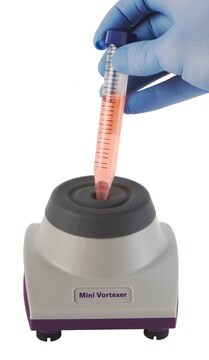DPNI-RO
Roche
Dpn I
from Diplococcus pneumoniae
About This Item
Produits recommandés
Source biologique
bacterial (Diplococcus pneumoniae)
Niveau de qualité
Forme
solution
Conditionnement
pkg of 1,000 U (10742988001 [10 U/μl])
pkg of 200 U (10742970001 [10 U/μl])
Fabricant/nom de marque
Roche
Paramètres
37 °C optimum reaction temp.
Température de stockage
−20°C
Description générale
The enzyme is an isoschizomer to Bsp143 I, Dpn II, Mbo I, Nde II and Sau3A I.
Methylation sensitivity
The enzyme is only inhibited by the occurrence of 5-methylcytosine at the indicated site (*) if no 6-methyladenine is present.
Typical ligation and recutting assay
Dpn I fragments obtained by complete digestion of 1μg pBR322 DNA are ligated for 16 hours at +4°C with 1U T4 DNA Ligase in 10μl buffer that contains 66mM Tris-HCl, 5mM MgCl2, 5mM Dithiothreitol, 1mM ATP, pH 7.5 (at +20°C). The percentages of product that can be ligated and subsequently recut with Dpn I (yielding the typical pattern of pBR322 × Dpn I fragments) are stated under "Lig" and "Rec" in the certificate of analysis.
Spécificité
GmAT*C
Restriction site: GmA↓T*C
GmA↓T*C
Heat inactivation: No inactivation of Dpn I after incubation at 65 °C for 15 minutes.
Application
Qualité
1μg pBR322 DNA is incubated for 16 hours in 50μl SuRE/Cut Buffer A with an excess of Dpn I. The number of enzyme units which do not change the enzyme-specific pattern is stated in the certificate of analysis.
Absence of exonuclease activity
Approximately 5μg [3H] labeled calf thymus DNA are incubated with 3μl Dpn I for 4 hours at +37°C in a total volume of 100μl 50mM Tris-HCl, 10mM MgCl2, 1mM Dithioerythritol, pH approximately 7.5. Under these conditions, no release of radioactivity is detectable, as stated in the certificate of analysis.
Compatibilité
Profil d'ADN
- λ: 116
- φX174: 0
- Ad2: 87
- M13mp7: 8
- pBR322: 22
- pBR328: 27
- pUC18: 15
- SV40: 8
Définition de l'unité
Remarque sur l'analyse
The buffer in bold is recommended for optimal activity
- A: 100%
- B: 75-100%
- H: 75-100%
- L: 50-75%
- M: 75-100%
Relative activity in PCR mix (Taq DNA Polymerase buffer) is 100%. The PCR mix contained λDNA, primers, 10 mM Tris-HCl (pH 8.3, 20 °C), 50 mM KCl, 1.5 mM MgCl2, 200 μM dNTPs, 2.5 U Taq DNA polymerase. The mix was subjected to 25 amplification cycles.Activity in reaction buffer of Pwo SuperYield DNA Polymerase PCR Mix is 100%; Pwo SuperYield DNA Polymerase PCR Mix is not available in U.S.
Autres remarques
Composants de kit seuls
- Enzyme Solution
- SuRE/Cut Buffer A 10x concentrated
Code de la classe de stockage
12 - Non Combustible Liquids
Classe de danger pour l'eau (WGK)
WGK 1
Point d'éclair (°F)
does not flash
Point d'éclair (°C)
does not flash
Certificats d'analyse (COA)
Recherchez un Certificats d'analyse (COA) en saisissant le numéro de lot du produit. Les numéros de lot figurent sur l'étiquette du produit après les mots "Lot" ou "Batch".
Déjà en possession de ce produit ?
Retrouvez la documentation relative aux produits que vous avez récemment achetés dans la Bibliothèque de documents.
Articles
The term “Restriction enzyme” originated from the studies of Enterobacteria phage λ (lambda phage) in the laboratories of Werner Arber and Matthew Meselson.
Contenu apparenté
Restriction endonucleases in prokaryotes function primarily to protect against foreign genetic material, notably bacteriophage DNA.
Restriction endonucleases in prokaryotes function primarily to protect against foreign genetic material, notably bacteriophage DNA.
Restriction endonucleases in prokaryotes function primarily to protect against foreign genetic material, notably bacteriophage DNA.
Restriction endonucleases in prokaryotes function primarily to protect against foreign genetic material, notably bacteriophage DNA.
Notre équipe de scientifiques dispose d'une expérience dans tous les secteurs de la recherche, notamment en sciences de la vie, science des matériaux, synthèse chimique, chromatographie, analyse et dans de nombreux autres domaines..
Contacter notre Service technique






